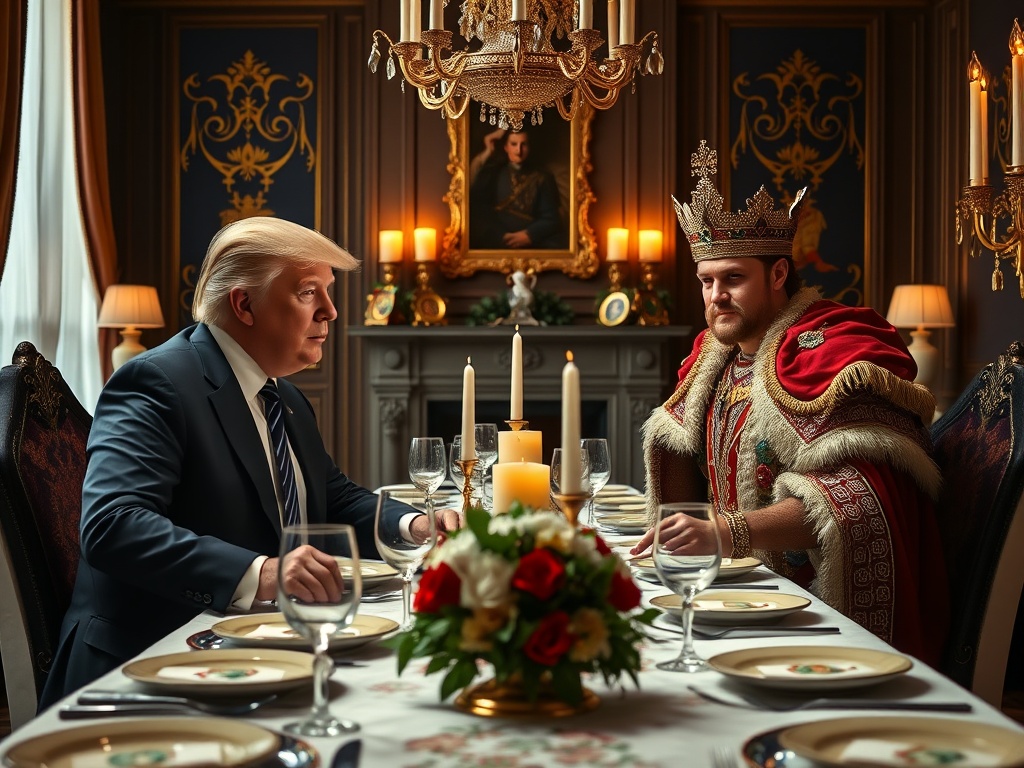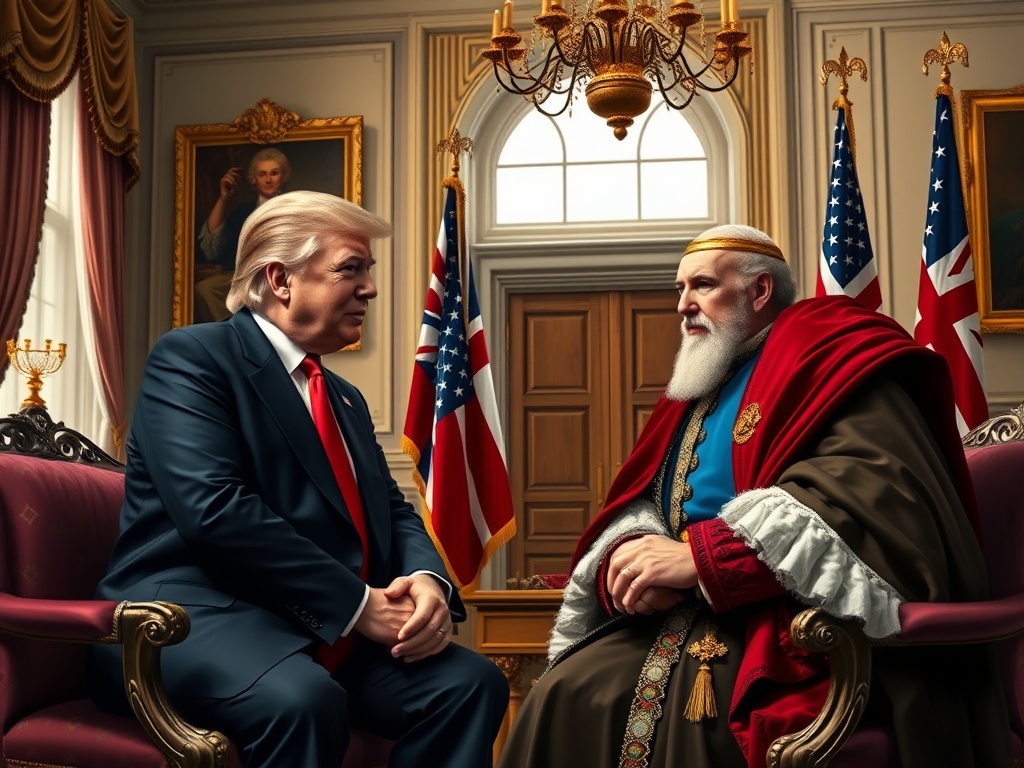Trump’s Anticipated Meetings with King Charles III

Former President Donald Trump has expressed his desire to meet with King Charles III in Scotland within the next few months. Reports indicate that a state visit to the UK could potentially occur as early as this year. In a significant development for Lord Mandelson, the newly appointed British ambassador in Washington, both the UK government and the Trump administration are reportedly finalizing dates for two key visits: a private meeting with the King, either at Balmoral or Dumfries House, and a subsequent state visit marked by all the grandeur that the UK can offer.
The i Paper has revealed that while consultations regarding diaries are ongoing among the King and political leaders, both the British and American teams are eager to secure these visits sooner rather than later. They anticipate reaching an agreement for a state visit, possibly scheduled for 2025 or 2026. Mandelson is spearheading this expedited process, which has been prioritized and aims to bypass the usual lengthy planning that can take up to three years for royal and presidential trips.
Trump, who has long admired the British monarchy, is said to be “highly enthusiastic” about reinforcing the special relationship between the UK and the US. Close associates report that he wishes to visit his golf properties in Scotland—Menie, situated 58 miles from Balmoral, and Turnberry, just 28 miles from Dumfries House—to assess their performance. This interest was part of the rationale behind the King’s invitation during a carefully orchestrated moment at the White House, where Trump read aloud a letter from the monarch presented by Labour leader Keir Starmer.
During that meeting, Trump referred to the King as “a great, great gentleman,” emphasizing the positive rapport they share. As soon as dates are confirmed, Buckingham Palace officials will begin the planning process. A senior royal source commented, “All we can say for the moment is, it will be when diaries allow.”
Starmer aims to expedite the process compared to former Prime Minister Theresa May, whose invitation to Trump for his inaugural state visit took two and a half years to materialize. May was the first world leader to meet Trump in the White House, just a week after his inauguration in January 2017, but the state visit did not transpire until June 2019, following standard planning protocols.
A British-hosted visit over two to three days would provide Starmer and his ministers a prime opportunity to leverage Trump’s well-known admiration for the Royal Family in fostering a more favorable relationship between the UK and the unpredictable President. However, there is a potential complication: a visit by the King and Queen to the United States next year has been tentatively scheduled to commemorate the 250th anniversary of US independence, although no formal invitation has been extended by President Trump. Despite these plans, officials in Whitehall believe that both events can coexist, allowing for both a state visit to the UK this year and a trip to the US in the same year if necessary.
This potential US trip would follow in the footsteps of Queen Elizabeth II, who visited the States in 1976 alongside Prince Philip to mark the nation’s bicentennial. Speculation has also arisen regarding whether the Prince and Princess of Wales might instead represent the monarchy in the US, but well-informed sources have downplayed this notion.
- Dumfries House, left, and Balmoral Castle, right.
- Both locations are contenders for hosting Trump during his private visit with the King in Scotland.
King Charles III, aged 76, and Trump, aged 78, have maintained a friendship for over two decades, frequently exchanging correspondence that Trump holds in high regard. He has referred to the monarch as “a beautiful man, a wonderful man,” emphasizing the depth of their relationship.
Officials in Downing Street and the Foreign Office hope that the King’s longstanding friendship with Trump will help preserve the special relationship between the US and the UK, especially in light of the current threats to the transatlantic alliance that has been a cornerstone of security and prosperity in Europe since World War II.
However, not everyone supports a swift visit. Some observers argue that it might be wise to postpone Trump’s visit, suggesting that the prospect of being the first president to receive two state visits from the UK might encourage more temperate behavior from him, particularly after recent diplomatic tensions involving Ukraine.
Royal commentator and Majesty magazine’s managing editor Joe Little suggested that an informal visit to Scotland could serve as a preliminary assessment before planning a state visit in the coming years. “That would keep the balls up in the air for the time being. There’s no reason to fast-track it,” he stated. “Clearly, at the moment everything is still raw, and people are still readjusting to the new reality.” Additionally, public sentiment in the UK has shifted against Trump, with a recent Survation poll indicating that 51% of Britons believe he would not be welcome on a state visit, while only 30% support his arrival.
On Friday, London Mayor Sadiq Khan intensified the debate by warning Trump to brace for widespread protests during his potential visit to the capital. Khan stated that Londoners would “exercise their right to free speech and the right to protest” when the US President arrives.
Evie Aspinall, director of the British Foreign Policy Group think tank, posited that the King could adopt a ‘good cop’ role while Starmer or another figure plays the ‘bad cop’ or a critical friend. The King might privately address policy differences with Trump—having previously discussed climate change during Trump’s last visit to Britain—but is expected to be more cautious in public statements. “He isn’t going to speak out against Trump’s approach,” Aspinall noted, “but he can make points with softer statements.”
Charles faces a challenging diplomatic balancing act, representing not just the UK but also 14 other Commonwealth realms, including Canada. Canada has recently entered a trade dispute with the US after Trump imposed tariffs and suggested annexation, prompting Prime Minister Justin Trudeau to vow retaliation.
Canadian public sentiment is strong against Trump’s actions, leading to boycotts of American goods. Canadian royalists are increasingly vocal, urging the King to advocate for their interests and address Trump’s aggressive stance. The Monarchist League of Canada, which has seen a surge in membership since January, expressed hopes that Trudeau would advise Charles to take a stand against Trump’s threats, reinforcing the King’s role in supporting Canadian sovereignty.
The King’s diplomatic mission is further complicated by the need to balance British government interests with the Canadian government’s urgent concerns regarding Trump. Nonetheless, it is believed that Charles is ready to leverage his influence with Trump to advocate for Canada’s position.
As the stakes rise, the King is poised to play a crucial role in diplomatic efforts aimed at preserving the UK’s special relationship with the US and ensuring peace in Europe amidst ongoing geopolitical tensions.
Earlier this week, four former British ambassadors to Washington warned that the US can no longer be viewed as a reliable ally and may even seek to undermine the UK’s nuclear deterrent and NATO’s Article 5 mutual defense clause. Sir David Manning, who served as ambassador in Washington from 2003 to 2007 and later advised Prince William on foreign affairs, highlighted a “seismic change” in the relationship, suggesting that Britain may need to seek new alliances in light of this evolving landscape.




